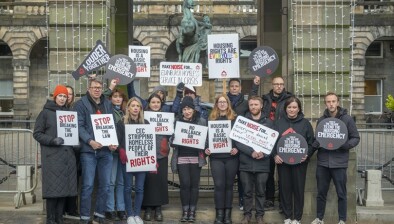Average monthly rents in Scotland up 1.1 per cent

Average monthly rents in Scotland have risen by 1.1 per cent in the past year, the slowest increase in almost two years, new figures show.
The rise was the smallest annual increase since April 2013, according to the latest Buy-to-Let Index from lettings agent network Your Move.
The average residential rent across Scotland increased only £6 in the year to February, reaching £537 per month last month.
On a monthly basis, Scottish rental prices have climbed 0.2 per cent since January, marking the first monthly rent rise since November 2014.
Meanwhile, the financial health of tenants appears to have declined, with February seeing the highest proportion of late rent since December 2012.
Edinburgh and the Lothians experienced the strongest annual rent growth, with prices climbing 2.5 per cent (equal to £15) in the twelve months to February 2015, closely followed by Glasgow and Clyde, where rents are up 2.3 per cent (£12) year-on-year.
The Highlands and Islands experienced the biggest annual drop in average rents, which fell 1.6 per cent, equivalent to £9 in cash terms.
Meanwhile, monthly rents in the South of Scotland are 1.5 per cent lower than in February 2014.
While rent rises have decelerated, many tenants are still behind with their payments.
In February 2015 the proportion of late rent rose to 8.1 per cent, its highest level for more than two years.
Rosemary Brotchie, policy and research manager at Shelter Scotland, said: “These figures showing a rise in rent arrears in the private rented sector are very worrying.
“Earlier this year our analysis of the Scottish Government’s homeless statistics showed that an increasing proportion of homelessness applications are coming from the private rented sector, which is now home to more than 80,000 families with children.
“Tenants in the private rented sector need predictable rents and a stable and secure tenancy. That’s why our Make Renting Right campaign is asking for progressive reform of the sector to make it fit for families and fair for all.”







